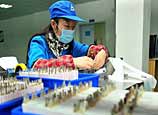
Wang said that not all of the district's officials are required to report their assets.
"We will learn from the practices in Hong Kong and Macao, where only around 40 percent of departments require their officials to report their assets," she added.
Under the current proposal, such information will be reported to the Party's anti-graft authorities rather than disclosed to the public, she said.
Shi Jishan, head of the Party's anti-graft body in Changchun, doubted officials could voluntarily report their assets in an honest manner.
"In the past, most officials who have been found guilty of corruption refused to admit their wrongdoing," he said. "So it would be impossible for all officials to voluntarily reveal their assets."
Nanjing's experience
The authorities in Jiangning district of Nanjing, Jiangsu province, put forward a policy requiring officials to declare personal assets as early as June 2011.
Officials in the district are required to report their savings, real estate, cars, and the business their spouses and children are engaged in before being promoted, according to the policy.
So far, a total of 198 officials from 59 workplaces in the district have completed their asset reports.
The anti-graft body will verify the declaration, and officials who conceal the assets will have their names listed before further punishment is made.
Long Xiang, head of Nanjing's anti-graft body, said the pilot program had some influence on newly promoted officials, but the asset declaration system still has some problems, including difficulties in verification and the coverage of higher-level officials.

















 Creative DIY by Chinese students
Creative DIY by Chinese students


![]()
